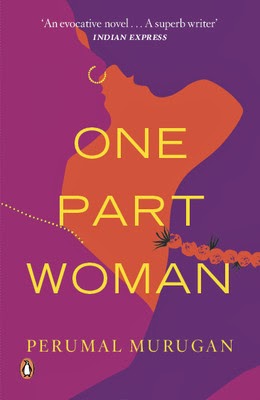Book
Review
Perumal
Murugan’s novel, One Part Woman,
which attracted unnecessary controversy in Tamil Nadu recently, is essentially
about the fundamental complementarity of the male and the female components of
humanity. “The male and the female together
make the world,” as the priest in the Ardhanareeswara temple tells Kali, the
protagonist. Within each individual too
there exists both the male and the female components. Who destroyed that harmonious balance between
the male and the female?
Is
it the Brahmin who expediently creates and imposes certain rules and
regulations on the people? The novel
raises this question when a Brahmin lawyer gets toddy and arrack banned in the
Salem district and thus throws the whole Sanar community out of “their
traditional livelihood.”
But
the novel never suggests that the Brahmins have been responsible for the loss
of certain traditions. It does not even
suggest that the traditions are sacred or useful in any significant ways. It even questions the gods and people’s faith
in them. Kali, having performed many religious
rituals and sacrifices, wonders when the thirst of the gods will be sated.
Gods
and traditions don’t seem to serve profound functions in the actual practical
world of human affairs. In fact, the
former can be bent to suit the needs of the latter. Thus there is a ritual in Tiruchengode when
married childless women can mate with a stranger in order to beget an
offspring.
For
Kali, his wife Ponna is the other half of his very being. He cannot view her as
a person apart. Kali and Ponna together
would form an Ardhanareeswara. But they
do not get a child in spite of all their passionate love-making, in spite of
all the religious rituals and sacrifices they perform. Finally the suggestion comes from their
mothers that Ponna should find her divine mate during the religious
festival.
Can
the supposed sanctity of a religious ritual heal the rupture caused to the
sanctity of the marital relationship? In
other words, how does Ponna who has undergone much torment because of her
childlessness view the suggestion of finding her divine mate? How does her view affect Kali for whom Ponna
is really not a distinct individual but is the complementary half of himself?
The
novel probes the deep relationship that Kali and Ponna have built up, a
relationship which cannot apparently be broken by any force. It also delves into the problem of
childlessness which is often believed to be the result of some curse. It probes the validity of certain religious
practices.
Uncle
Nallupayyan is a sharp contrast to the sensitive Kali. Nallupayyan (which ironically means ‘good boy’)
does not see any sanctity in human relations.
“If one can freely get the pleasure of a woman without getting married,
who would want to get married?” he asks.
For him life is a series of enjoyments and sex is part of that series. Traditions and religious rituals make no sense
to him. When the village decides to
punish him for cutting off his caste’s trademark hair-knot, his answer is: “If
the village’s honour resides in my bloody hair, I will grow it.... I don’t even
mind growing a beard and a moustache. I
will grow them and sit around like you all, plucking lice from it. But add
another thing to it. It was only
yesterday that I shaved off my pubic hair, because it was itching too
much. Now if your village honour is also
dependent on my pubic hair, let me know right away. I will grow that too.”
Kali
and Uncle Nallupayyan are contrasting approaches to absurd religious
practices. Kali is tormented by them,
while Nallupayyan is able to cast them off with the ease of a snake that sheds
its worn-out scales. The majority lie in
between seeking and finding their gods and goddesses in ways that suit them.
Why
the resurgent Right Wing was offended by this novel is beyond my
comprehension. It seems they were
offended by the mating ritual mentioned in the novel. Of course, the author makes it amply clear
that the ritual took place in the olden days.
The novel is set in the days of the British Raj. We had many such practices in the ancient days. The devadasi system, for instance, had its
share of kitsch and twitch. Will the
Sangh Parivar demand the ban of all books on such practices?
One Part Woman is a delightful work of art
that takes us through certain labyrinths of an old Tamil Nadu village and its
religion. It shows us the various
dimensions of religious beliefs and how they keep life going even at the very
basic levels of sexual unions, and how they hinder life at times.

Comments
Post a Comment